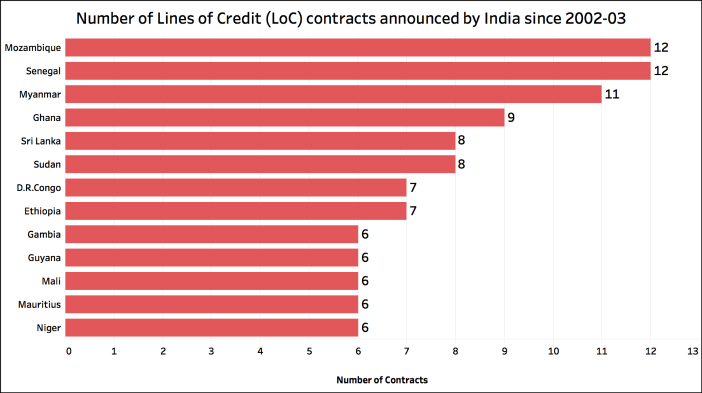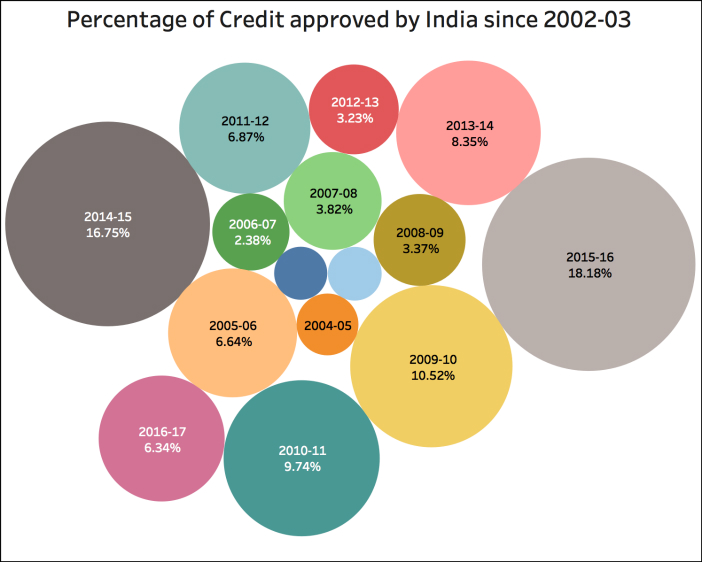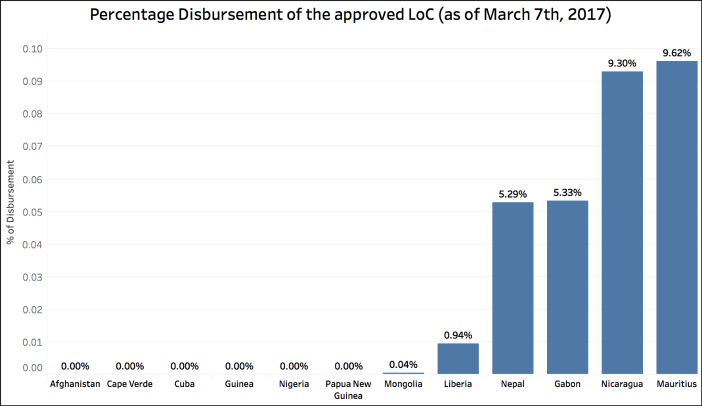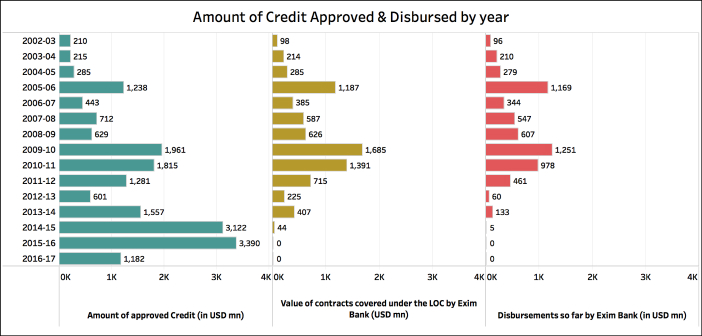[orc]Out of the more than USD 7.5 billion credit line promised by the current Prime Minister to various countries in the last 3 years, hardly any money has been disbursed.
Narendra Modi has been touted as the most travelled Prime Minister as well as a leader who has played many masterstrokes in international diplomacy. He has visited many countries, some for the very first time by any Indian leader in his position. But his foreign trips seem to be creating a peculiar problem for India.
On a trip to Mongolia in 2015, the Indian Prime Minister announced a credit of $1 billion along with an English Medium School and an IT Centre as a gift to Mongolia. Immediately after, The Telegraph reported that this could be an empty promise because the foreign office does not even have the financial ability to fulfill it. The report also lists several other promises previously made by the Prime Minister, which have been stalled or not fulfilled.
The promised line of credit to Mongolia temporarily made headlines and created speculation about a possible emergence of new power in India competing with China and Russia. By March 2017, Mongolia has not received any money from India (of the promise made by PM Modi) in spite of its economic troubles. Many commentators have written about the lost opportunity in Mongolia.
India’s lines of credit woes don’t seem to end with just Mongolia. Exim (Export- Import Bank of India) Bank data tells a familiar story.
Who is Exim Bank?
The Exim (Export – Import) Bank of India was set up in 1982 by the government of India to act as a provider of export credit and facilitating India’s international trade. Through different services and schemes, Exim bank aims to create more opportunities for Indian companies in the export map and in the larger frame increase India’s export capabilities by supporting the participating companies and clients by both risk analysis and provision for credit.
Exim Banks has offices in 9 Indian cities and overseas branches in Abidjan, Dhaka, Addis Ababa, Yangon, Dubai, Johannesburg, London, Singapore and Washington.
What is Lines of Credit (LOC)?
Lines of Credit (LOC) is Exim Bank’s core scheme. The scheme extends financial credit (loan) to overseas financial institutions, regional development banks, and sovereign governments. The credit includes promises made by the Indian PM in his foreign visits. The main clause of providing this credit is for the borrowing agency to import developmental, infrastructural projects, equipment, goods and services from India. According to Exim website, below are the important features of the scheme:
- The credit is for project export and import of goods and services from India
- Goods and Services (including consultancy services) for minimum of 75% value of the contracts covered under the loan must be sourced from India.
- Soft loans (A loan with no interest or below market rate interest to countries that cannot borrow at market rate) shall be free from all kinds of taxes and duties of any nature levied in the recipient country.
Exim Bank’s Contracts and Disbursements
The data of Government of India’s lines of credit is available since 2002-03. A large number of African countries, followed by Asian countries have been beneficiaries of the Exim Bank’s lines of credit scheme. Mozambique & Senegal have been recipients of 12 such contracts followed by Myanmar with 11. A total of 64 countries have been approved credit by India since 2002-03.

As per Exim Bank’s records, the time between borrowers requesting credit, approval by the bank and signing the contracts has taken approximately two years or less since 2002-2003. In some special cases like with the Government of Syria, it took 4 years for the contract to be signed after it was requested in 2004. In fact, 23 such LoCs are yet to be signed though they are already approved. One such approval dates back to 2006-07, one to 2009-10, one to 2011-12. The others are pending since 2013-14.
Delay in signing the Contracts
In December, 2015, replying to a question in the Lok Sabha, the Minister of State for External Affairs – General VK Singh (Retd) said “The actual implementation of LOC projects in various countries is dependent on local factors, such as prevailing political & social conditions, statutory clearances by the borrowing Governments, making available land and other infrastructural support. In many cases, the borrowing governments may not wish to proceed with the LOC or change the purpose or are unable to provide detailed information regarding the project through a proper Detailed Project Report / Feasibility Study.”
While it is true that local factors and commitment do play a huge role in the lines of credit (LOC) translating into an actual disbursement, it is shocking that so many countries or agencies are not interested to complete their credit process after initiating it and getting approval from Exim Bank. Out of the 80 contracts that have been approved between 2012-13 and 2016-17, 52 contracts have not been disbursed any money by Exim Bank. 23 of the contracts have not even been signed after approval, as of 07th March 2017.
Considering that many of these contracts are soft loans that countries have requested for financial support due to their inability to get credit elsewhere for market rate, the delay and pattern of delay is not only demoralizing but also absolutely unprofessional. If the feasibility study of Exim Bank does not find the borrowing country’s request meritorious, it could either not approve it or terminate the process. Instead just having many pending contracts to be signed for years without clarity is puzzling.
Delay in Disbursement
It is worth noting that 40% of more than USD 18.6 billion credit approved by India since 2002-03 has been approved in the last 3 years. 18% of all the credit was approved in 2015-16, 16.75% in 2014-15 and 6.34% in 2016-17. Interestingly, the number of contracts signed in these three years’ account for only 18% of all the contracts signed since 2002-03. In other words, the worth of the contracts signed in the last three years has been significantly high and the number of contracts, which have reached beyond approval stage, is very low.

Of the 64 countries that have been approved LoC by India, 12 countries have received less than 10% of the approved amount including Mongolia. 22 countries have received less than 25% of the approved amount and 41 countries have received less than half the approved the amount. Only 9 countries have received more than 90% of the approved amount. Of the more than 18 million USD of committed LoC, only USD 6 billion odd has been disbursed till date (less than 1/3rd).

Most pending disbursements from recent years.
Most of the pending disbursements are from the recent years. Out of the more than USD 7.5 billion approved credit since the current government took over, hardly any money has been disbursed.

Cause for embarrassment?
A closer look at the borrowing countries and projects tendered indicate that many of them are in order to build crucial infrastructural systems. The following are the areas with highest no of projects pending:
- Electrification & Transmission Sub Stations
- Hydro and Solar Generation Capacities
- Irrigation and Agricultural Mechanization
On top of these pending contracts, the bank lists up to 17 new projects from various tenders that are still in the pipeline, indicating that credit has been requested.
Promise of credit made by the Prime Minister to various countries is a serious step in trade diplomacy. Such delay or ambiguous processing of lines of credit not only causes international embarrassment but also makes India’s global trade commitments flippant in nature.
Featured Image: Credit support promised by the PM


